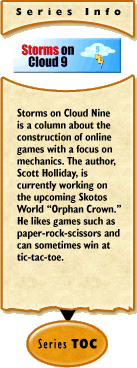
Makers of Dusk and Dawnby Scott Holliday One of the conclusions of my last article concerned the eventual creation of the "next generation" game that would truly change the landscape. In particular, my theory is that this game will be the first graphical MMO that allows player-designed game-level content. I've been saying this for a while now, as you will discover by scanning through my previous articles over the previous years. Earlier this month, there was a very interesting bit of evidence. I originally caught the news third-hand on Slashdot, but even so, it caused quite a bit of speculation. Linden Labs had done an analysis of the player generated content in their game, Second Life. They noted that the players themselves were putting in "approximately 23,000 human hours of play-work per day." This was calculated to be the equivalent of $400 million dollars of creative input per year - which the players were doing for fun, for free. Disregarding the argument of the quality of work, the nature of SL as an MMO (if it is one), or even whether the evidence is completely accurate, I imagine every game developer in the world sat up and took notice. Imagine if your game had a live-team that invested $400 million dollars per year in new content. What would it look like a year from now? Five years from now? Furthermore, this same creative ability is exactly what some players (such as myself) find most exciting in the proposed games of the future. Tools are needed. Modeling software built into the application? Level-design methods? Scripting hooks for controlling quests and story-lines? However, most developers already have many of these tools in-house. How do you think they design their own quests? I assure you, nobody wants to hard-code in something that simple and repetitive. Structures and rules are needed. For a consistent, serious MMO, player-made content will need to fit into the theme (and challenge versus reward) of the rest of the game. Who judges new content before it is made available to the public? On what criteria is it judged? Who decides what is (and is not) appropriate? Will the developers' own creations be given special treatment? How can game-level story-lines be used tie all the player-made content together? It's easy to consider the possibilities, but obviously the jury isn't even in session (yet). My prediction is that over the next couple of years there will be a plethora of MMO releases promising player-made content. Who will win? At a guess - whoever allows the most freedom without breaking their own game. Who will lose? That much is obvious. The games of the previous generation. Unless they adapt to fit the coming age, today's style of MMO games will be not be here tomorrow. Even so, as I regard the changes on the horizon, I look back as well. The older gamers among us know that player-created content is nothing new. It's old hat. In fact, most text-MMO players will tell you that it was once the norm (and still is in some places). I think myself lucky to have been there at the beginning of the MUD/MOO boom. During that period, once you had played for a while, it was expected that you would become a "Wizard" and start adding content to the game. I've done plenty of that, and it was the most fun I've had in any computer game before or since. Where did it go? When did the industry take a left-turn? Why? Looking only at the big dogs, it seems like there was a sudden shift in game-design mentality at the moment UO hit. EverQuest followed in the same path, and so did every major release thereafter. I often wonder what their reasoning was. Did they know something we don't? Perhaps they avoided a trap which now we are falling into? I don't know. I can guess (having been there during both of those releases), that the games were already so different and new (and huge and buggy) that the design team didn't even want to think about more problems. However, it seems that all the games to follow, all the way down the path to those today, have learned all the wrong lessons. |
